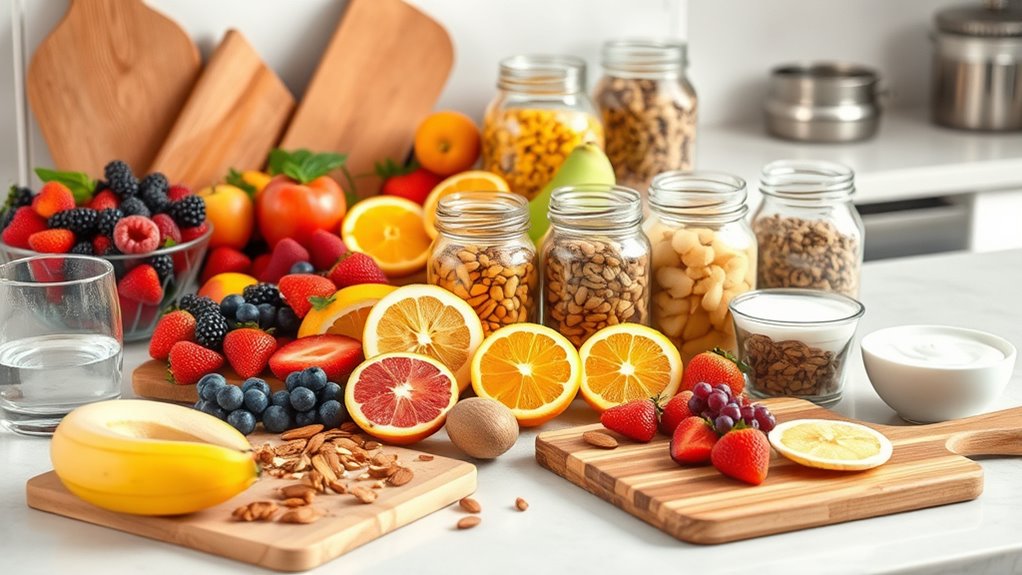To limit your sugar intake, start by swapping sugary drinks like soda for flavored water or lemon water, and replace sweets with fruit or nuts. Read labels carefully to spot hidden sugars and choose products without added sweeteners. Adopt gradual changes, such as reducing portion sizes and increasing protein and fiber in meals, to help develop a less sweet palate. Staying aware and making small adjustments can considerably improve your health—continue exploring ways to cut back effectively.
Key Takeaways
- Read food labels carefully to identify and avoid hidden added sugars in packaged products.
- Gradually replace sugary drinks with flavored water or lemon water to reduce cravings.
- Opt for natural sweeteners like honey or maple syrup in moderation instead of refined sugar.
- Incorporate more whole fruits, nuts, and vegetables to satisfy sweet cravings healthily.
- Develop consistent habits and set realistic goals to steadily decrease overall sugar consumption.

Reducing sugar intake can substantially improve your overall health and energy levels. When you start paying attention to the foods you eat, you’ll quickly realize how much hidden sugar is present in everyday products. To make smarter choices, it helps to explore alternatives like natural sweeteners, which can satisfy your sweet tooth without the negative effects of refined sugar. Options such as honey, maple syrup, or agave nectar often contain beneficial nutrients and tend to be less processed. However, it’s important to remember that these should still be used in moderation, as they are concentrated sources of sugar. Incorporating natural sweeteners into your diet can be a way to gradually phase out refined sugars, but always keep in mind that portion control is key.
A vital step in reducing sugar intake is learning to read labels carefully. Many packaged foods, from condiments to snacks, contain added sugars that can sneak past your awareness. When reading labels, look beyond the first few ingredients. Ingredients like high-fructose corn syrup, cane sugar, glucose, or maltose signal added sugars that you might want to avoid or limit. Often, products marketed as “healthier” or “low-fat” contain surprising amounts of sugar to enhance flavor. By becoming a diligent label reader, you can identify and steer clear of these hidden sources. This habit empowers you to make more informed choices, ultimately helping you lower your overall sugar consumption.
Another effective strategy is to gradually cut back on sugary snacks and beverages. Start by replacing soda with sparkling water flavored with a splash of natural fruit juice or a squeeze of lemon. Instead of reaching for candy or baked goods, opt for fresh fruit or a handful of nuts. Over time, you’ll develop a palate less reliant on sweetness and more receptive to the natural flavors of whole foods. Remember, it doesn’t have to be an all-or-nothing approach; small adjustments can lead to significant improvements. Consistency is essential, so set realistic goals and celebrate your progress.
Staying hydrated can also help curb sugar cravings. Sometimes, what feels like a desire for something sweet is actually dehydration. Drinking plenty of water throughout the day can reduce these urges and keep your energy levels steady. Additionally, ensuring you’re eating balanced meals with enough protein, fiber, and healthy fats helps stabilize blood sugar and reduce the impulse to seek out sugary snacks. When you combine these habits—using natural sweeteners thoughtfully, reading labels diligently, and making gradual changes—you set yourself up for success. Over time, you’ll notice not only a decrease in sugar intake but also improvements in your overall health and well-being. Incorporating awareness of sugar content in your diet further supports your health goals.
Frequently Asked Questions
How Can I Identify Hidden Sugars in Processed Foods?
You can identify hidden sugars in processed foods by carefully reading food labels and analyzing the ingredient list. Look for words like corn syrup, fructose, sucrose, or maltose, which indicate added sugars. Always check the nutrition facts for total sugar content. Being vigilant with food label reading and ingredient list analysis helps you spot sneaky sugars and make healthier choices, reducing your overall intake effectively.
Are Natural Sweeteners Better Than Refined Sugar?
Think of natural sweeteners as the gentle river, offering sweetness without the storm of refined sugar. They’re generally better because they contain fewer chemicals and have a lower glycemic index, causing less blood sugar spike. While refined sugar is like a quick flash of lightning—sweet but destructive—natural options like honey or maple syrup provide a more balanced, wholesome sweetness, making them a smarter choice for your health.
What Are Healthy Alternatives to Satisfy Sweet Cravings?
You can satisfy your sweet cravings with healthy options like fruit swaps, which offer natural sweetness and fiber. Try berries, sliced bananas, or apples with a touch of cinnamon. Dessert alternatives like Greek yogurt with honey or a small piece of dark chocolate also work well. These choices help curb your sweet tooth without overloading on refined sugars, making it easier to stay on track with your health goals.
How Does Sugar Intake Affect Mental Health?
Sugar impacts your mood by causing quick spikes and crashes in blood sugar levels, which can lead to feelings of irritability and fatigue. High sugar intake can increase anxiety because it triggers hormonal shifts that affect your stress response. When you consume too much sugar, you might notice mood swings and heightened anxiety, making it essential to monitor your intake for better mental health and emotional stability.
Can Reducing Sugar Improve Sleep Quality?
Sleep improves when you cut back on sugar, as it stabilizes your sleep cycles and lessens disruptions. Reducing sugar lessens the hormonal effects of sugar, which can cause spikes in energy and crashes that interfere with restful sleep. By limiting sugar, you support smoother sleep cycles, allowing your body to produce melatonin naturally, resulting in more peaceful, restorative sleep and waking up refreshed and ready for the day.
Conclusion
You might think cutting back on sugar is too hard, but it’s easier than you think. Small changes, like swapping sugary drinks for water or choosing fresh fruit, make a big difference over time. Don’t let the fear of missing out hold you back—your health benefits are worth it. Start today, and you’ll soon notice more energy and better overall wellness. Remember, every little step counts toward a healthier, happier you.








